Related Research Articles

Mind Games is the fourth solo studio album by English musician John Lennon. It was recorded at Record Plant Studios in New York in summer 1973. The album was released in the US on 29 October 1973 and in the UK on 16 November 1973. It was Lennon's first self-produced recording without help from Phil Spector. Like his previous album, the politically topical and somewhat abrasive Some Time in New York City, Mind Games received mixed reviews upon release. It reached number 13 in the UK and number 9 in the US, where it was certified gold.
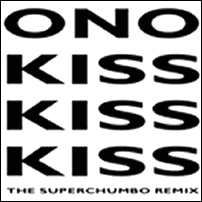
"Kiss Kiss Kiss" is a song by Japanese singer Yoko Ono. It was originally released on Double Fantasy, her joint album with John Lennon, as well as on the B-side of his "(Just Like) Starting Over" single. The disco and new wave-influenced song features Ono gasping heavily and appearing to reach orgasm.
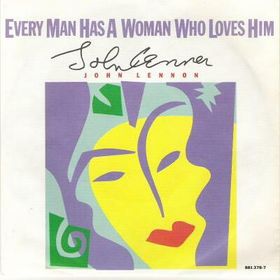
"Every Man Has a Woman Who Loves Him" is a song by Yoko Ono from the album Double Fantasy with John Lennon. Other versions were released, including one released as a single where Ono's voice was removed, leaving what had been Lennon's backing vocal as the primary vocal.
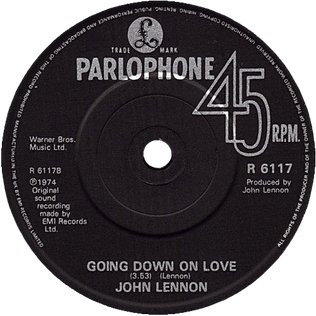
"Going Down on Love" is a song by John Lennon, released as the first track on his 1974 album Walls and Bridges. It was also released as the B-side of Lennon's "Jealous Guy" single in 1985.

"I'm Losing You" is a song written by John Lennon and released on his 1980 album Double Fantasy. It was written in Bermuda in June 1980, after several attempts by Lennon to call his wife, Yoko Ono, who remained in New York. The song is also available on the 1982 compilation The John Lennon Collection, the 1998 boxset John Lennon Anthology, the one disc compilation Wonsaponatime, the 2005 two disc compilation Working Class Hero: The Definitive Lennon and in 2010 for the Gimme Some Truth album. The song was also featured in the 2005 musical Lennon.
"Aisumasen (I'm Sorry)" is a song written by John Lennon released on his 1973 album Mind Games. The song is included on the 1990 box set Lennon.
"I Know (I Know)" is a song written by John Lennon released on his 1973 album Mind Games. The song is included on the 1998 box set John Lennon Anthology and the 2020 compilation album Gimme Some Truth. The Ultimate Mixes.

"Sisters, O Sisters", also known as "Sisters O Sisters", is a song written by Yoko Ono that first appeared on John Lennon's and Yoko Ono's 1972 Plastic Ono Band album Some Time in New York City, backed by Elephant's Memory. It was also released as the b-side to the couple's "Woman Is the Nigger of the World" single. It has been covered by a number of artists, including Le Tigre and Tater Totz.
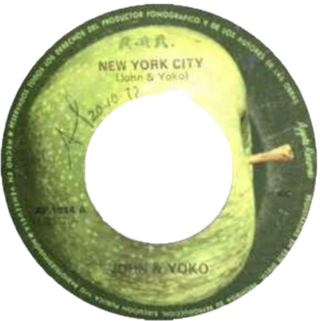
"New York City" is a song written by John Lennon that was first released on Lennon's and Yoko Ono's 1972 Plastic Ono Band album Some Time in New York City.
"We're All Water" is a song written by Yoko Ono that was first released on the 1972 John Lennon and Yoko Ono Plastic Ono Band album Some Time in New York City. It was the last song on the first record of the album, and the last song on the album that was recorded in the studio.
"Bless You" is a song written by John Lennon that was first released on his 1974 album Walls and Bridges. It is a ballad expressing his love for his wife Yoko Ono, from whom he was separated at the time. Alternative versions appeared on the compilation albums Menlove Ave. and John Lennon Anthology.
"Scared" is a song written by John Lennon that was first released on his 1974 album Walls and Bridges. Alternate versions were subsequently released on the compilation albums Menlove Ave. and John Lennon Anthology.
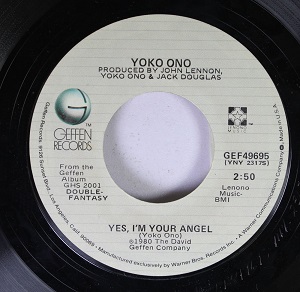
"Yes, I'm Your Angel", also known as "I'm Your Angel", is a song written by Yoko Ono that was first released on Ono's and John Lennon's 1980 album Double Fantasy. It was later released as the b-side of Lennon's single "Watching the Wheels." The initial release of Double Fantasy used the title "I'm Your Angel" but later releases as well as the single used the title "Yes, I'm Your Angel."
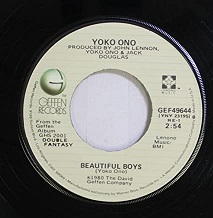
"Beautiful Boys" is a song written by Yoko Ono that was first released on Ono's and John Lennon's 1980 album Double Fantasy. It was later released as the B-side of Lennon's #1 single "Woman."

"I'm Moving On" is a song by Yoko Ono. It was originally recorded for 1980's Double Fantasy album, with John Lennon. A remix was released on iTunes on 25 September 2012. The remix debuted at number 39, and peaked at number 4.
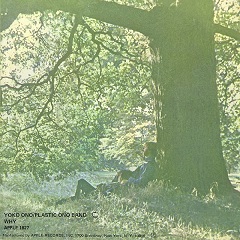
"Why" is a song written by Yoko Ono that was first released on her 1970 Yoko Ono/Plastic Ono Band album. In the U.S. it was also released as the B-side of John Lennon's "Mother" single, taken from his John Lennon/Plastic Ono Band album.

"Touch Me" is a song written by Yoko Ono that was first released on her 1970 album Yoko Ono/Plastic Ono Band. An edited version was later released in the U.S. as the b-side to John Lennon's single "Power to the People."
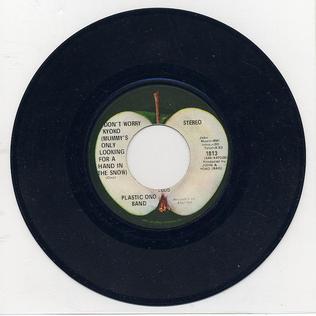
"Don't Worry Kyoko (Mummy's Only Looking for A Hand in the Snow)" is a song by Yoko Ono that was originally released by Plastic Ono Band in October 1969 as the B-side of the "Cold Turkey" single, and was later released on Ono's 1971 album Fly. Several live versions have been released, including on Plastic Ono Band's Live Peace in Toronto 1969 and the John & Yoko/Plastic Ono Band With Elephant's Memory album Some Time in New York City in 1972. An early version was titled "Mum's Only Looking for Her Hand in the Snow". It has been covered by several other artists.

"Listen, the Snow Is Falling" is a song written by Yoko Ono and recorded by Ono and the Plastic Ono Band that was first released as the B-side of John Lennon's 1971 single "Happy Xmas ." A version of the song was later released on a reissue of Lennon and Ono's Wedding Album and was covered by Galaxie 500.

"Move Over Ms. L" is a song written by John Lennon. It was originally intended to be released on his 1974 album Walls and Bridges but was left off shortly before the album release, and was eventually released as the b-side to Lennon's "Stand by Me" single. In the interim it was released by Keith Moon on his album Two Sides of the Moon. Moon also released it as the B-side of his "Solid Gold" single.
References
- 1 2 3 4 5 6 7 8 9 Blaney, J. (2007). Lennon and McCartney: together alone : a critical discography of their solo work. Jawbone Press. pp. 143, 144, 199. ISBN 978-1-906002-02-2.
- ↑ Harrison, E. (20 December 1980). "Last LP Shows New Insights". Billboard Magazine . p. 28. Retrieved 3 January 2013.
- ↑ Erlewine, S.T. "Double Fantasy". Allmusic . Retrieved 3 January 2013.
- ↑ Hopkins, Jerry (1986). Yoko Ono. Macmillan. p. 214. ISBN 0025539507.
- 1 2 3 4 5 6 Jackson, A.G. (2012). Still the Greatest: The Essential Solo Beatles Songs. Scarecrow Press. pp. 185–187. ISBN 978-0-8108-8222-5.
- 1 2 3 4 5 6 du Noyer, P. (1999). John Lennon: Whatever Gets You Through the Night. Thunder's Mouth Press. pp. 103–104. ISBN 1-56025-210-3.
- 1 2 3 4 5 Rogan, J. (1997). The Complete Guide to the Music of John Lennon. Omnius Press. pp. 114–115. ISBN 0-7119-5599-9.
- 1 2 3 Sheff, D. (2000). All We Are Saying: The Last Major Interview with John Lennon and Yoko Ono . Macmillan. pp. 222–223. ISBN 978-0-312-25464-3.
- ↑ Madinger, C.; Easter, M. (2000). Eight Arms to Hold You. 44.1 Productions. p. 121. ISBN 0-615-11724-4.
- 1 2 3 Urish, B. & Bielen, K. (2007). The Words and Music of John Lennon. Praeger. p. 76. ISBN 978-0-275-99180-7.
- ↑ Riley, T. (2009). Tell Me Why: The Beatles: Album by Album, Song by Song, the Sixties and After. Da Capo Press. p. 384. ISBN 978-0-7867-3090-2.
- 1 2 Rosen, R. (2002). Nowhere Man: The Final Days of John Lennon . Quick American Archives. p. 157. ISBN 978-0-932551-51-1.
- ↑ Roger Farrington (8 December 2015). "Rick Nielsen, Earl Slick and Jack Douglas Discuss the Recording of John Lennon's Final Album, 'Double Fantasy'". guitarworld. Retrieved 3 July 2023.
- ↑ Rodriguez, R. (2010). Fab Four FAQ 2.0: The Beatles' Solo Years 1970–1980. Hal Leonard. p. 192. ISBN 978-0-87930-968-8.